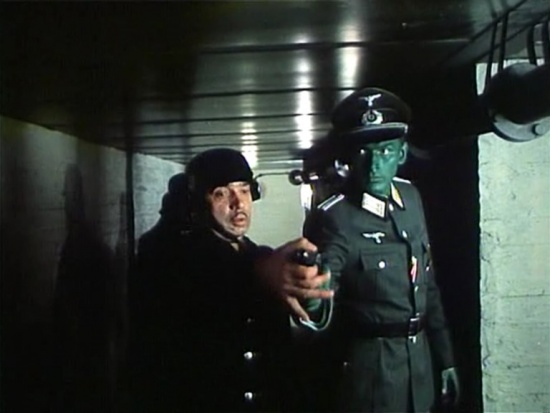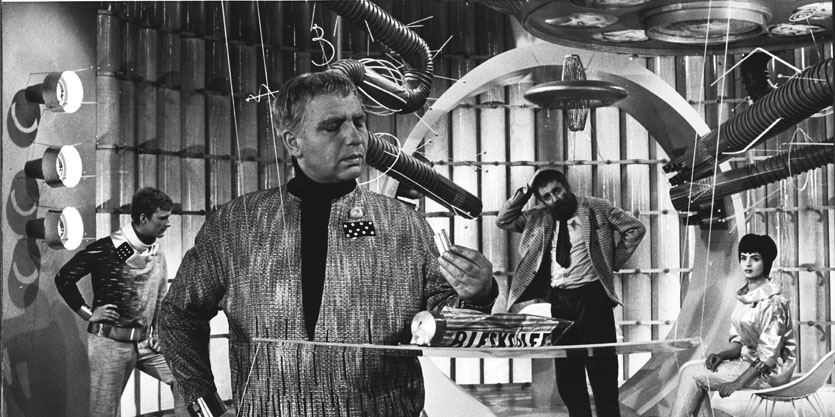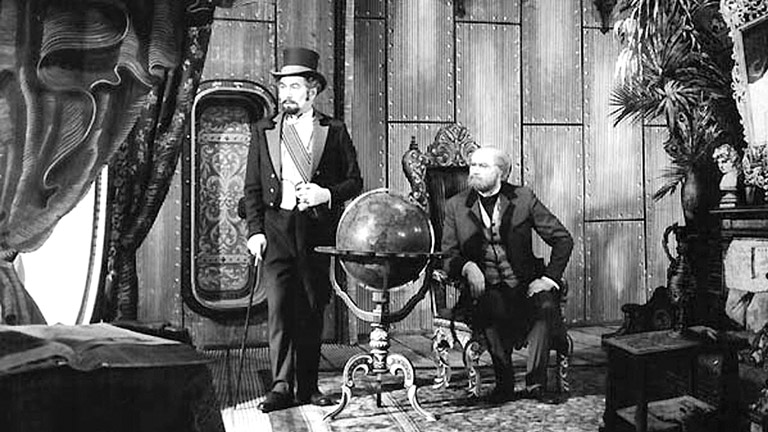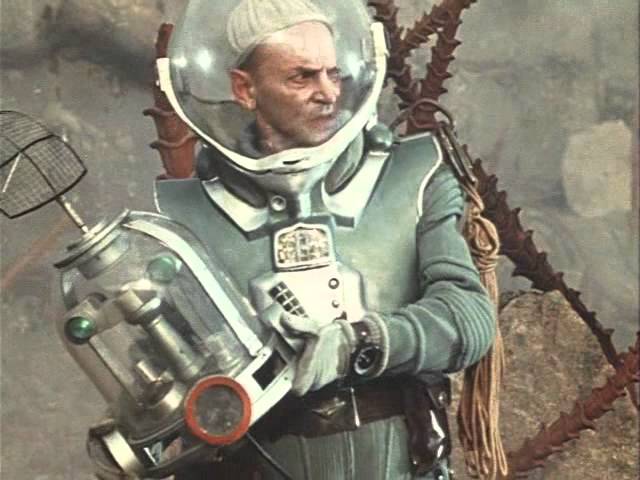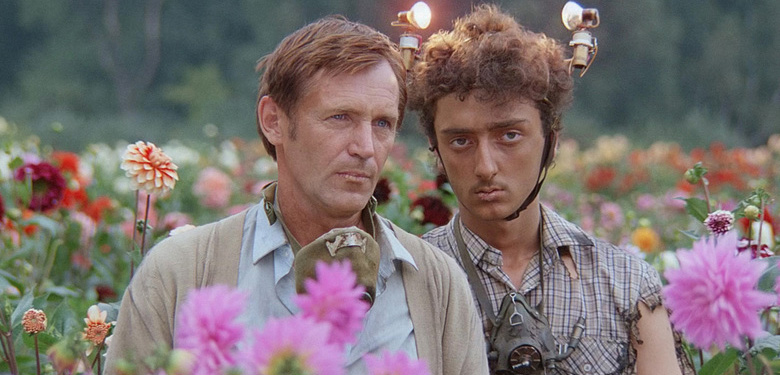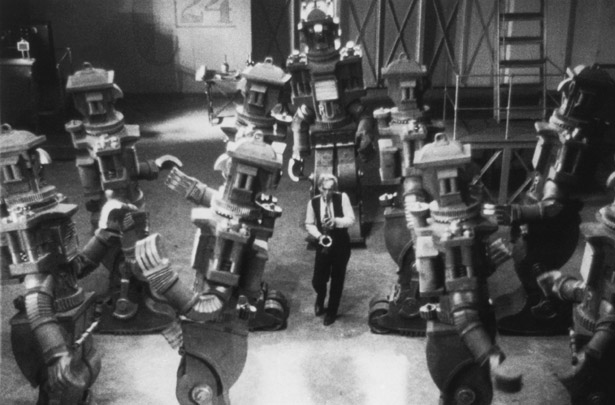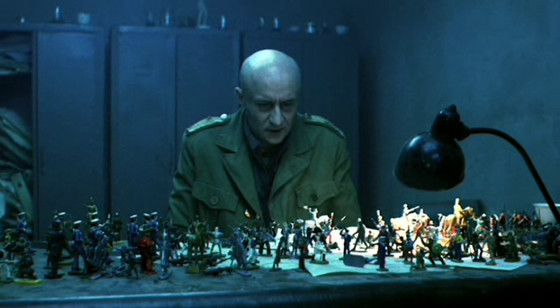14. Tomorrow I’ll Wake Up and Scald Myself with Tea (Jindrich Polak, 1977)
Unsurprisingly, given the title, this is a far less moody work than Polak’s earlier Ikarie Xb-1. It is a somewhat farcical comedy science fiction film about time travel. A group of former Nazis plots to change the outcome of the second world war by sending an agent back in time. Unfortunately, or perhaps fortunately, their time traveller dies by choking on a croissant.
When his twin brother decides to impersonate him, to protect the feelings of his brother’s wife, he unexpectedly becomes part of the nazi time travel plot. It is far from a serious science fiction film, and the special effects are rather dated, but the film certainly lives up to its plot in providing a genuinely original and fun take on time travel.
15. The Man From The First Century (Oldrich Lipsky, 1962)
The Man From The First Century (alternate title: Man in Outer Space), is a science fiction comedy from Czechoslovakia. Joseph, a humble upholsterer accidentally launches himself into outer space, and returns to find earth five hundred years into the future. At first sight, it seems that Earth has finally resolved all of its problems, there is peace and order.
Obviously there is an ideological subtext here, implying the success of the communist project. Joseph is initially happy in this utopia, but love and desire soon intercede. The film’s set design and effects are highly inventive, and the cast is excellent. While some of the humour may fly over the heads of outsiders, there is still plenty to enjoy.
16. The Fabulous World of Jules Verne (Karel Zeman, 1958)
The Fabulous World of Jules Verne is a Czechoslovak adventure film that combines elements from several stories by Jules Verne. It is noted for its innovative combination of live action and animation. The animation was designed to evoke the original line engravings that accompanied Verne’s stories.
A panoply of visual effects are deployed: double exposure, stop-motion, miniatures, paintings, and many more. Like Ikarie Xb-1, this film also features a score by Zdenek Liska, who creates a wonderfully naive mood using what sound like music boxes, harpsichords, and other more conventional instrumentation.
17. Planeta Bur (Pavel Klushantsev, 1962)
Three ships are on their way to Venus. When one is destroyed by a meteorite, the remaining two crews are asked to wait two months until a replacement arrives. Not so interested in waiting, the crews decide that exploring Venus is the better option.
On the planet they encounter dinosaur-like creatures, and hear distant and eerily Siren-like singing. This film was edited by none other than Roger Corman for its US release, which should give you a sense of what to expect.
18. Kin-Dza-Dza! (Georgiy Daneliya, 1986)
Kin-Dza-Dza! is an epic dystopian sci-fi comedy that has had a strong cult following since its release in 1986. The protagonists are “Uncle Vova”, a construction worker, and “Violinist” a Georgian student. When they independently approach a strange and apparently homeless vagrant spouting nonsense, they are suddenly transported to an alien planet (Pluke, in the Kin-Dza-Dza galaxy) by the stranger’s teleportation device.
Pluke is a satirical allegory for earth and its inhabitants, and much of the film’s surreal humour comes from the odd deviations and distortions of everyday human givens.
19. Gibel Sensatsii (Aleksander Andriyevsky, 1935)
Gibel Sensatsii (often titled Loss of Feeling or The Robots of Ripley) offers an intriguing insight into early Soviet thinking about the role of automatons in society. Ripley is an engineer who is proud to have created a robot that can fulfill most of the tasks of the worker. But the workers see Ripley as a traitor who will potentially rob them of their livelihoods with his invention.
While this is certainly no Metropolis, it does provide an entertaining, if naive, idea about the hopes and fears of the Russian proletariat in the age of mechanization.
20. O-Bi, O-Ba: The End of Civilization (Piotr Szulkin, 1985)
Like War of The World, this film is all but forgotten, but certainly worth seeking out for any fan of off-beat dystopian science fiction. Like the other film, this too is injected with a rather caustic sense of humour, no doubt inspired by contemporary struggles with the authorities.
In the near future, the world has been ravaged by nuclear war. The survivors, human wreckage, barely survive in an underground concrete bunker. Their only hope is The Ark, a mysterious ship that will, it is said, come to rescue them.
Author Bio: Ciaran is originally from Dublin, Ireland, but currently lives in New York. He has passionate interest in European and Japanese cinema – the old stuff in particular. The directors who have left the deepest impression on him are Jacques Rivette, Eric Rohmer and Marco Ferreri.
